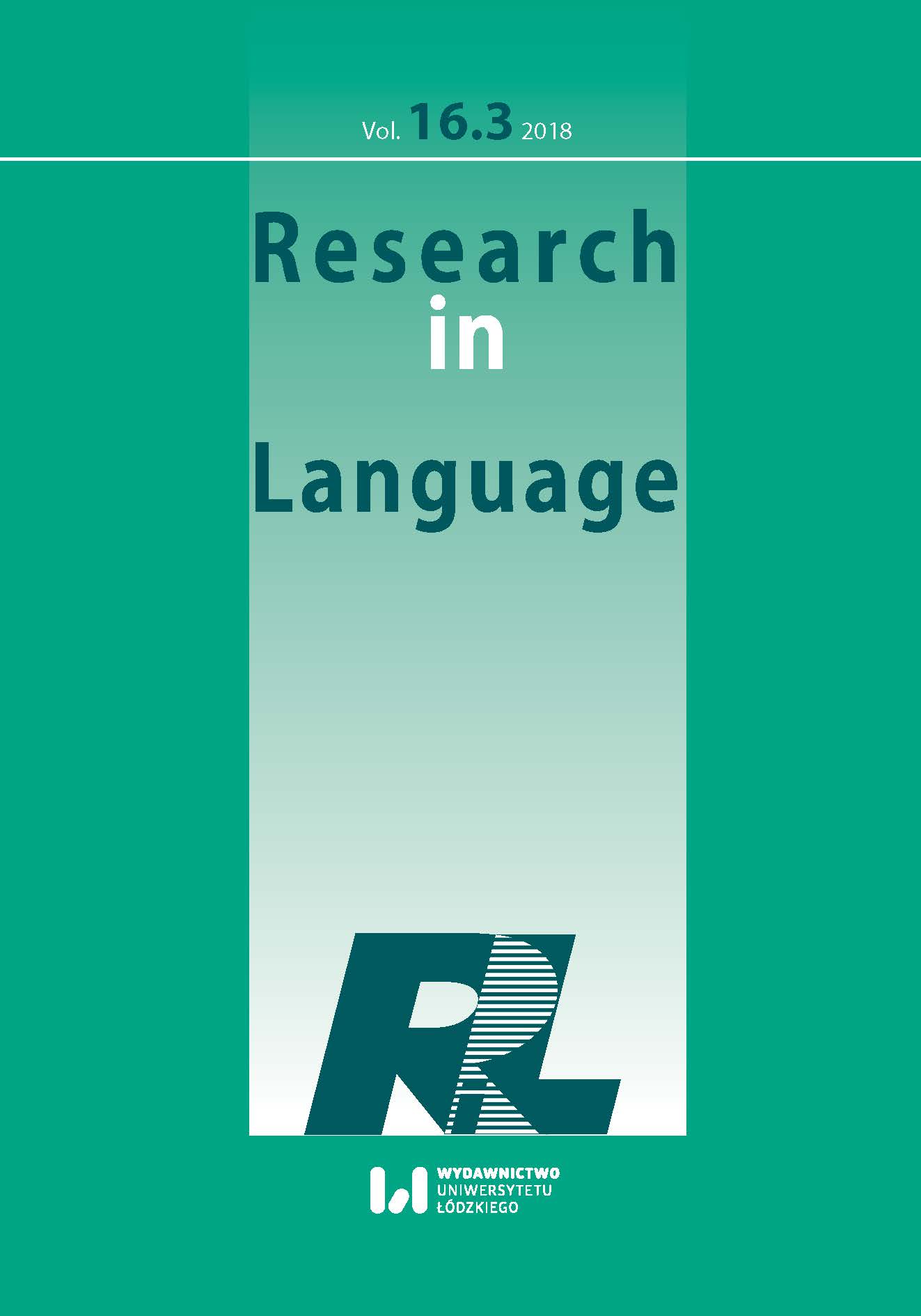Lexicogrammatical Features in Japanese English: A Study of Five Speakers
DOI:
https://doi.org/10.2478/rela-2018-0017Keywords:
creativity, Japanese English, lexicogrammatical features, multiple knowledge about two languagesAbstract
Japanese English (JE) refers to the English spoken by Japanese citizens. This paper characterizes JE by examining its lexicogrammatical features produced by five speakers participating in experimental recordings. Drawing on the initiatives taken by Cogo and Dewey’s seminal work (2012), this study presents nine lexicogrammatical features which are taken to be typical of JE. It is shown that one decisive factor in creating a new variant is the formation of an alternative form to its native counterpart and this mechanism is sourced from the speaker’s multiple knowledge about two languages.
References
Abe, Emiko. 2013. Communicative language teaching in Japan: current practices and future prospects. English Today 29 (2). 46–53.
Google Scholar
Boersma, Paul and David Weenink. 2017. Praat: doing phonetics by computer (Version 6.0.40) [computer software]. Available from: http://www.praat.org/
Google Scholar
Browne, Charles M. and Minoru Wada. 1998. Current issues in high school English teaching in Japan: an exploratory survey. Language, Culture and Curriculum 11 (1). 97–112.
Google Scholar
Cogo, Alessia and Martin Dewey. 2012. Analysing English as a Lingua Franca: A Corpus-driven Investigation. London/New York: Continuum.
Google Scholar
Cook, Vivian. 2007. The goals of ELT: Reproducing native-speakers or promoting multicompetence among second language users? In
Google Scholar
Corder, Stephen Pit. 1967. The significance of learners’ errors. International Review of Applied Linguistics 5. 161–170.
Google Scholar
Crystal, David. 2010. The future of Englishes: going local. In: Roberta Facchinetti, David Crystal and Barbara Seidlhofer (eds.), From International to Local English – And Back Again, 17–25. Bern: Peter Lang.
Google Scholar
D’Angelo, James F. 2018. The status of ELF in Japan. In: Jennifer Jenkins, Will Baker and Martin Dewey (eds.), The Routledge Handbook of English as a Lingua Franca, 165–175. London: Routledge.
Google Scholar
Friedman, Jeffrey. 2016. English education in the era of Meiji Japan. World Englishes 35 (1). 3–17.
Google Scholar
Honna, Nobuyuki and Yuko Takeshita. 1998. On Japan’s propensity for native speaker English: a change in sight. Asian Englishes 1 (1). 117–134.
Google Scholar
Houghton, Stephanie Ann and Damian J. Rivers. 2013. Native-speakerism in Japan: Intergroup Dynamics in Foreign Language Education. Bristol: Multilingual Matters.
Google Scholar
Jenkins, Jennifer. 2018. The future of English as a lingua franca? In: Jennifer Jenkins, Will Baker and Martin Dewey (eds.), The Routledge Handbook of English as a Lingua Franca, 594–605. London: Routledge.
Google Scholar
Kachru, Braj. 2017. World Englishes and Culture Wars. Cambridge: Cambridge University Press.
Google Scholar
Mackenzie, Ian. 2016. Multi-competence and English as a lingua franca. In: Vivian Cook and Li Wei (eds.), The Cambridge Handbook of Linguistic Multi-competence, 478–501. Cambridge: Cambridge University Press.
Google Scholar
McKenzie, Robert M. 2008. The complex and rapidly changing sociolinguistic position of the English language in Japan: a summary of English language contact and use. Japan Forum 20 (2). 267–286.
Google Scholar
McKenzie, Robert M. 2013. Changing perceptions? A variationist sociolinguistic perspective on native speaker ideologies and Standard English in Japan. In: Stephanie Ann Houghton and Damian J. Rivers (eds.), Native-speakerism in Japan: Intergroup Dynamics in Foreign Language Education, 219–230. Bristol: Multilingual Matters.
Google Scholar
Ranta, Elina 2018. Grammar in ELF. In: Jennifer Jenkins, Will Baker, and Martin Dewey (eds.), The Routledge Handbook of English as a Lingua Franca, 244–254. London: Routledge.
Google Scholar
Seargeant, Philip (ed.). 2011. English in Japan in the Era of Globalization. Basingstoke: Palgrave Macmillan.
Google Scholar
Seidlhofer, Barbara. 2004. Research perspectives on teaching English as a lingua franca. Annual Review of Applied Linguistics 24. 209–239.
Google Scholar
Selinker, Larry. 1972. Interlanguage. International Review of Applied Linguistics 10. 209–241.
Google Scholar
Smith, Donald L. 2004. Review of Japanese English: Language and Culture Contact (James Stanlaw). Asian Englishes 7 (2). 126–132.
Google Scholar
Stanlaw, James. 2014. Japanese English: Language and Culture Contact. Hong Kong: Hong Kong University Press.
Google Scholar
Strevens, Peter. 1992. English as an international language: directions in the 1990s. In: Braj B. Kachru (ed.), The Other Tongue, 27–47. Urbana/Chicago: University of Illinois Press.
Google Scholar
Suenobu, Mineo. 1990. Nihon Eigo [Japanese English]. In: Nobuyuki Honna (ed.), Ajia no Eigo [Varieties of English in Asia], 257–286. Tokyo: Kuroshio.
Google Scholar
Swan, Michael. 1985. Where is the language going? English Today 3. 6–8.
Google Scholar
Swan, Michael. 2012. ELF and EFL: are they really different? Journal of English as a Lingua Franca 1–2. 379–389.
Google Scholar
Tsuboya-Newell, Ikuko. 2017. Why do Japanese have trouble learning English? The Japan Times. [Online] 29th October. Available from: https://www.japantimes.co.jp/opinion/2017/10/29/commentary/japan-commentary/japanese-trouble-learning-english/ Accessed: 17th April 2018.
Google Scholar
Tsuneyoshi, Ryoko. 2013. Communicative English in Japan and “Native speakers of English.” In: Stephanie Ann Houghton and Damian J. Rivers (eds.), Native-speakerism in Japan: Intergroup, Dynamisms in Foreign Language Education, 119–131. Bristol: Multilingual Matters.
Google Scholar
Yamaguchi, Toshiko and Magnús Pétursson. 2018. Japanese English: Norm-dependency and emerging strategies. English Today 34 (2). 17–24.
Google Scholar
Downloads
Published
How to Cite
Issue
Section
License

This work is licensed under a Creative Commons Attribution-NonCommercial-NoDerivatives 4.0 International License.










